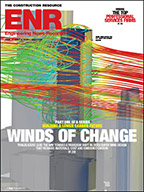Critics say "good riddance" to the expiration late last year of a federal production tax credit (PTC) that paid wind, geothermal and biomass energy generators 2.3 cents per kilowatt hour (kWh) for as long as 10 years. They contend that the wind market, in particular, has been around for decades and that it should not continue to be supported by the PTC if it is not yet self-sufficient.

"How long do you give an 'emerging market,' [because the wind industry] has been doing this for decades," says Thomas J. Pyle, president of non-profit American Energy Alliance, which last month undertook a week-long initiative including a $40,000-ad campaign with its parent firm, the Institute for Energy Research, targeting the subsidy.
Pyle says renewal of the 2013 PTC will cost taxpayers $12 billion over 10 years. "If an industry is not efficient or affordable, we shouldn’t support it through credits," Pyle says. He adds that nearly 30 states have renewable energy mandates "so [these alternative energy industries] have a guaranteed market share."
The credit, which has a long history of being temporarily renewed after expiration, also pays 1.1 cents/kWh to municipal solid waste and certain other alternative power firms. The payment period generally applies to the first 10 years of operation. If Congress does not renew the PTC, say those who stand to benefit from it, the future of new projects and investment in these technologies is in jeopardy.
"Despite experiencing a sharp slow-down in the first six months of 2013, the wind industry has picked up steam. Utilities have been signing a record number of power purchase agreements for wind energy, manufacturers have been re-hiring and many projects have begun construction," says Rob Gramlich, senior vice president of public policy at trade group American Wind Energy Association (AWEA), Washington.
The PTC, which was last renewed in January 2013 and modified to allow projects that began construction that year to qualify, is an effective tool, he says. The modification allows companies to continue to build projects already under way.
AWEA is focusing on the tax reform process given that extending the PTC "isn’t likely to move" while Washington lawmakers continue discussions on comprehensive tax reform, Gramlich says. "But if tax reform does not pass in this Congress, we should not prematurely sunset clean energy tax credits, since that would destroy investors’ expectations for many projects currently being planned and destabilize already fragile markets."


Post a comment to this article
Report Abusive Comment